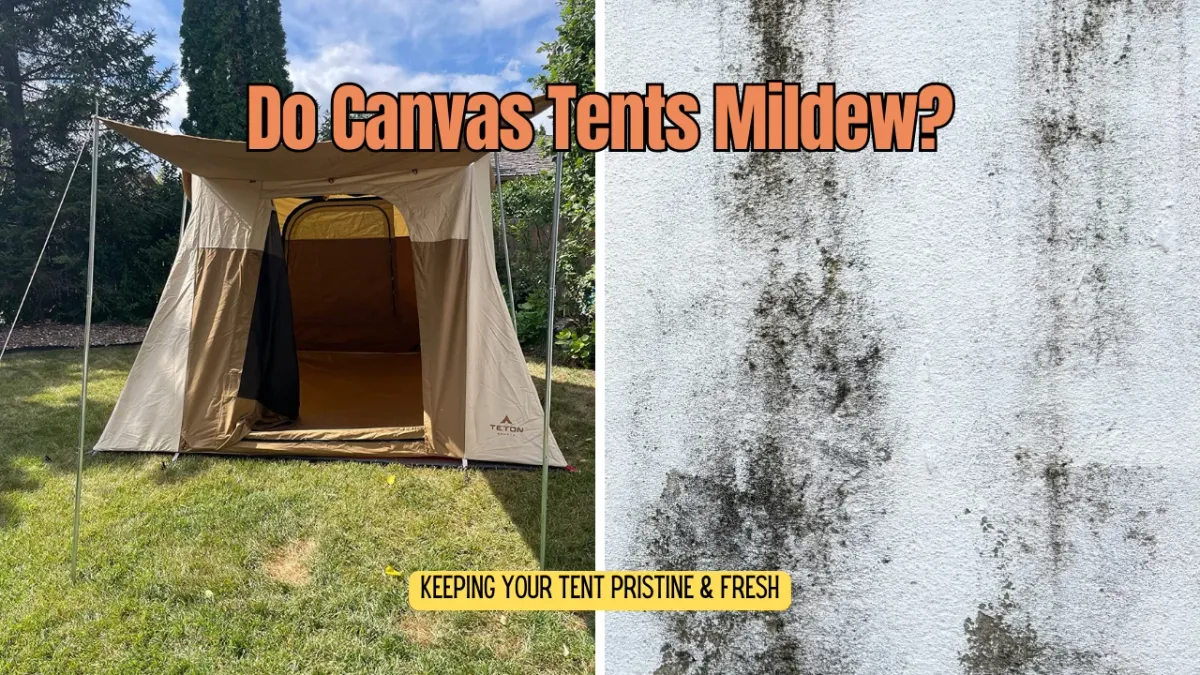Canvas tents have long stood as the definitive shelter solution for military base camps and explorers alike, spanning centuries of use. Known for their durability and classic aesthetic, canvas tents are a staple in the camping world. But one question often arises: how long should canvas tents last? This comprehensive guide will delve into the factors that affect the longevity of canvas tents and provide practical advice to ensure your tent stands the test of time.
Key Takeaways:
- The lifespan of a canvas tent can vary greatly, but with proper care, it can last for decades.
- Environmental factors, maintenance routines, and frequency of use all play critical roles in determining a canvas tent's durability.
- Investing in quality materials and taking proactive steps in tent care can significantly extend the life of your canvas tent.

Understanding the Canvas Tent
Canvas tents provide a robust and breathable shelter, making them ideal for a variety of outdoor conditions. The canvas fabric, typically made from cotton or a cotton-polyester blend, offers a unique combination of strength and breathability. This fabric choice is key to the tent's ability to withstand elements like sun, snow, and rain while maintaining a comfortable interior environment.

The Impact of Material Quality
The quality of the canvas fabric is a significant determinant of a tent's lifespan. Heavy-duty, duck canvas is renowned for its resistance to wear and tear. When comparing a canvas tent to a standard tent made from materials like nylon or polyester, the canvas often comes out on top in terms of durability. However, it's important to note that even within canvas tents, the quality can vary. High-grade, tightly woven canvas will outlast lower-quality alternatives.
Environmental Exposure
Canvas tents are built to endure the outdoors, but constant exposure to harsh conditions can shorten their lifespan. UV rays from direct sunlight can degrade the canvas over time, while heavy winds and snow can strain the tent poles and fabric. Additionally, natural elements like tree sap and bird droppings can also cause damage if not cleaned promptly.
The Role of Proper Maintenance
Proper maintenance is crucial for extending the life of a canvas tent. Regular cleaning to remove dirt, mold, and mildew is essential. Ensuring the tent is completely dry before packing it away will prevent the growth of mold and mildew, which can weaken the canvas fabric. Additionally, applying a water-resistant coating can help protect the tent from rain and moisture.
Frequency of Use and Care
How often you use your canvas tent and how well you care for it during and after each use will greatly influence its longevity. A tent used year-round will naturally experience more wear and tear than one used occasionally. However, with diligent care and maintenance, even a frequently used tent can last for many years.

The Evolution of Canvas Tents: From Cotton to Synthetic Blends
Canvas tents have come a long way from the traditional cotton canvas to the inclusion of synthetic blends. The classic cotton canvas tent is renowned for its durability and breathability, making it a staple for camping enthusiasts. However, advancements in materials have led to the development of canvas fabric that incorporates polyester or nylon, offering a lighter weight option without sacrificing too much on the robustness. These modern canvas tents provide improved water resistance and are less prone to shrinking or stretching, which can be a game-changer in extended use scenarios.
The blend of synthetic materials with cotton has also resulted in canvas wall tents and bell tents that are more resilient to UV rays and mold. The synthetic tent versions often come with a tent fly or rain fly that adds an extra layer of protection against the elements. This evolution means that a good tent can now better withstand direct sunlight, high winds, and heavy duty use. When considering how long a canvas tent should last, these modern materials can extend the life expectancy significantly, especially when combined with proper maintenance and care.
Maximizing Durability: Protecting Your Canvas Tent from the Elements
When considering how long a tent last can last, it's crucial to think about the environmental factors it will face. Canvas tents are robust, but they're not invincible. Exposure to UV rays can degrade the canvas fabric over time, causing it to weaken and lose its water resistance. To extend the life of your tent, position it in shaded areas whenever possible or use a tent fly to shield it from direct sunlight. Similarly, heavy duty canvas wall tents are designed to withstand high winds and snow, but ensuring that guy lines are properly secured can prevent undue stress on the tent poles and fabric roof.
In addition to sunlight and wind, canvas tents must contend with rain and ground moisture. A ground tarp beneath your tent can protect the floor from dampness and abrasions, while a well-angled rain fly helps to divert water away from the side walls. Bell tents and wall tents with a stove jack are particularly vulnerable to water ingress around the opening, so regular checks and maintenance are essential. By taking these protective steps, you can ensure that your canvas camping tents remain a durable haven in the great outdoors for extended periods.

The Versatility of Canvas Tents in Various Climates
Canvas tents are renowned for their adaptability across different weather conditions, making them a top choice for campers worldwide. How long can a canvas tent last in such varying climates? The answer lies in the canvas fabric's breathability, which reduces condensation and maintains a comfortable interior atmosphere, whether under the scorching sun or amidst snow. The duck canvas used in these tents is tightly woven, providing a sturdy barrier against the elements while allowing air to circulate, preventing the stifling effect found in a nylon tent or polyester tent.
In extreme conditions, such as high winds or heavy snow, the resilience of a canvas wall tent or a bell tent is put to the test. The tent poles and guy lines must be robust enough to withstand the forces of nature. Canvas tents provide a heavy-duty shelter with their thick canvas walls and reinforced seams, offering peace of mind during turbulent weather. The rain fly and ground tarp work in tandem to keep the interior dry, while the stove jack allows for a wood stove, making a canvas tent a cozy refuge even in cold weather.
Canvas Tent Innovations: Enhancing Functionality and Comfort
The evolution of canvas tents has seen the integration of modern conveniences that cater to the needs of glamping enthusiasts and hardcore campers alike. Features such as built-in tent zippers, stove jacks, and door frames have transformed the traditional canvas tent into a luxurious glamping tent abode. The bell tents and wall tents now come with sewn-in floors to protect against dirt and moisture, and side walls that can be rolled up to let in a breeze or accommodate a picturesque view.
Moreover, the tent setup has been simplified over the years, with tent poles designed for easy assembly and canvas fabric that is more lightweight yet remains durable. This makes packing and transportation less cumbersome, allowing for extended use in various locations. The tent's life is further extended by proper maintenance, such as regular cleaning to prevent mold and mildew, and applying protection against UV rays and tree sap. These advancements ensure that a good tent can be a reliable companion for camping outdoors year-round, offering a long-term shelter solution.

The Art of Canvas Tent Maintenance: Ensuring Longevity
The secret to a good tent that lasts year round lies in proper maintenance. After each camping trip, it's important to thoroughly clean your canvas tent to remove any dirt, mold, or bird droppings that could cause damage over time. If you've camped near trees, make sure to remove any tree sap from the canvas as it can harden and tear the fabric. When cleaning, use gentle soaps and avoid harsh chemicals that can break down the canvas fabric. Allow the tent to dry completely before packing it away to prevent mildew and moisture build-up.
Beyond cleaning, regular inspections of tent zippers, doors, and windows can save you from future headaches. Zippers should run smoothly without catching, and any tears or holes in the canvas should be repaired promptly to maintain protection against the elements. Nylon tent components, like rain flies or mesh doors, should also be checked for wear and tear. For those using their tents in cold weather or with a wood stove, ensuring that the stove jack is intact and the area around it is free from combustible debris is vital. With these maintenance practices, your canvas tent can provide a comfortable and safe space for camping adventures for many years to come.
The Integration of Modern Features in Canvas Tents
In the quest for the perfect outdoor shelter, canvas tents have been integrated with a variety of modern features to enhance the camping experience. For instance, glamping tents have popularized the use of stove jacks, allowing for a wood stove to be safely used inside the tent for warmth in cold weather. This feature alone has made canvas tents a viable option for tent year round adventures. Additionally, guy lines, heavy-duty zippers, and reinforced tent poles have become standard, ensuring that the tent setup can withstand the rigors of outdoors life.
Moreover, bell tents and wall tents now often include ground tarps and rain flies as part of their design, offering better ground protection and water resistance. The side walls and roof are typically designed to be steeper to prevent snow build-up, and the floor is made more durable to protect against dirt, mold, and mildew. The doors and windows are strategically placed and designed to maximize ventilation and less condensation, while still providing ample space and protection from the elements. With these advancements, canvas camping tents are not just about survival but comfort and convenience, accommodating the needs of the modern camper.

Storage and Transportation
Proper storage and transportation are key to preserving a canvas tent's condition. When not in use, the tent should be stored in a cool, dry place, away from direct sunlight and pests. During transportation, the tent should be packed carefully to avoid any punctures or tears, and tent poles should be secured to prevent bending or breaking.
The Importance of Tent Setup
A correct tent setup can prevent unnecessary stress on the tent fabric and poles. Ensuring that guy lines are properly tensioned and the ground tarp is laid out smoothly can protect the tent floor from abrasions and punctures. Additionally, a well-angled rain fly can prevent water from pooling and seeping into the tent.
Choosing the Right Tent Features
Other features of a canvas tent can contribute to its longevity. A stove jack allows for the use of a wood stove, which can be crucial for cold weather camping but must be installed correctly to avoid fire hazards. Reinforced corners, double-stitched seams, and heavy-duty tent zippers can also enhance the tent's durability.
The Benefits of Canvas Tents for Extended Use
For those considering long-term or glamping setups, canvas wall tents and bell tents are excellent choices. Their sturdy frame and spacious interior can accommodate furniture and other amenities, making them suitable for extended periods of use. The canvas material also results in less condensation compared to synthetic tents, providing a more comfortable living space.
When to Replace Your Canvas Tent
Despite all efforts to maintain and protect your canvas tent, there will come a time when it needs to be replaced. Signs of irreparable wear, such as large tears in the canvas, broken poles, or failing zippers, indicate that it's time for a new tent. However, with proper care, this moment can be delayed for many years.

Summary
A canvas tent can be a lifelong investment for the avid camper. With the right care, attention to environmental factors, and proper use, a canvas tent can last for decades. Remember to invest in quality materials, perform regular maintenance, and store your tent correctly to maximize its lifespan. By following the guidelines outlined in this article, you can ensure that your canvas tent remains a reliable and comfortable shelter for all your outdoor adventures.

FAQs
How often should I clean my canvas tent?
Clean your canvas tent after every trip, especially if it's been exposed to dirt, sand, or natural residues like tree sap. Always ensure the tent is completely dry before storing it.
Can I leave my canvas tent up year-round?
While canvas tents are durable, leaving them up year-round can expose them to prolonged weathering and environmental damage. It's best to take them down when not in use for extended periods.
What's the best way to repair a tear in my canvas tent?
For small tears, use a canvas repair kit with patches that match the tent fabric. For larger damages, it may be best to consult a professional or consider replacing the tent if the structural integrity is compromised.
Canvas and mildew:











